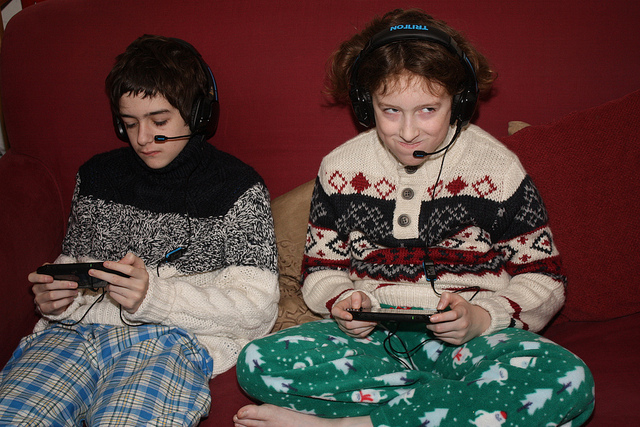If you ask most kids what they want to do for breaks and holidays, they may tell you they want to go to Disney World or on an elaborate vacation. But many 21st century kids might also tell you that they want time with no homework and more uninterrupted screen time. Similarly, if you ask them what they would like for gifts on their birthday or during the holiday season, they’ll likely ask for a smart phone, tablet, the newest console, or video games. In all likelihood, the gifts your children will receive this holiday will include video games and electronics. And perhaps the biggest gift in their eyes will be giving them as much time as they want to play with them. So it’s only natural that the question on a lot of parents’ minds this holiday is, “Should my kids be allowed more screen time during vacations?”
You know that once your child gets that video game or electronic device, they’ll want to play with it – sometimes nonstop. It is normal to be excited about a new gift, which lets you know that you did a good job picking it out! In my book, Playing Smarter in a Digital World, I strongly suggest developing a healthy “Play Diet” that balances digital play with physical, social, creative, and unstructured play as the best approach to limiting screen time. But maybe–just maybe–we might want to let things go a bit when it comes to game play. After all, how many of us overindulge in other ways over the holidays? While limit setting is often a necessary strategy for many kids, I suggest that parents lighten up a bit during their vacation time. If you have time off, you might want to play with them (and get crushed)! Here are seven reasons you should let them play a bit more:
Video games are cognitively challenging. The immediacy of feedback and the capacity of games to match challenge to the child’s level of mastery facilitate learning. Students who do not learn as well in traditional settings often find digital technologies and media to be incredibly powerful tools for learning academic subjects.
Restricting screen time all the time implies that it’s bad for you. Most screen time can be productive if children have other activities in their lives. Encourage screen time as part of a healthy Play Diet where digital play and screen time are balanced with physical, social, unstructured, and creative play.
Video games teach 21st century skills. Most of the world now runs on technology, and 21st century skills are being touted as the most important goal of our educational system. Video games help kids practice skills such as collaboration, creativity and problem solving.
Video games support outside interests. Research shows that kids who play sports video games are more likely to spend time going outside to play those sports. Many times games introduce new concepts and activities children that may never have encountered outside that video-game world.
Video games teach executive-functioning skills. Working memory, organization, self-control, planning, and self-awareness are just a few of the skills that video games can help build. Our research at LearningWorks for Kids demonstrates that children use these skills in games and–with parental, peer, or educator assistance–can then connect them to real-world learning.
Video games encourage children to be more social. Video games are believed to make kids anti-social, but they can actually make kids more socially aware and engaged. Aside from playing games online with friends, video games can teach kids about important social issues. There are many video games tackling social and political issues. They can learn about poverty and war in the third world (Darfur is Dying), laws and government (Do I Have a Right), and energy conservation (World Without Oil).
Technology is made to play together and can strengthen family ties. Playing together can make for closer relationships among family members, letting you laugh and learn from your kids. Research shows that girls who play more video games with their parents display more pro-social behavior towards family members.
So when your children want to use a bit more of their vacation time to engage with a screen, let them, but also try to make it a learning opportunity, a bit more digitally nutritious. When your kid wants to transition from unwrapping to plugging in, let them. You should even think about joining them. When you provide guidance, input, and even participation, you can make the technology they want the most really work for them.
Are you going to give your kids more screen time this holiday? Are you planning to play video games with your kids over vacation? What’s the video game you can’t wait to try out with your children? Let us know in the comments or come talk to us on Facebook.
Featured image: Flickr user Dark Dwarf




